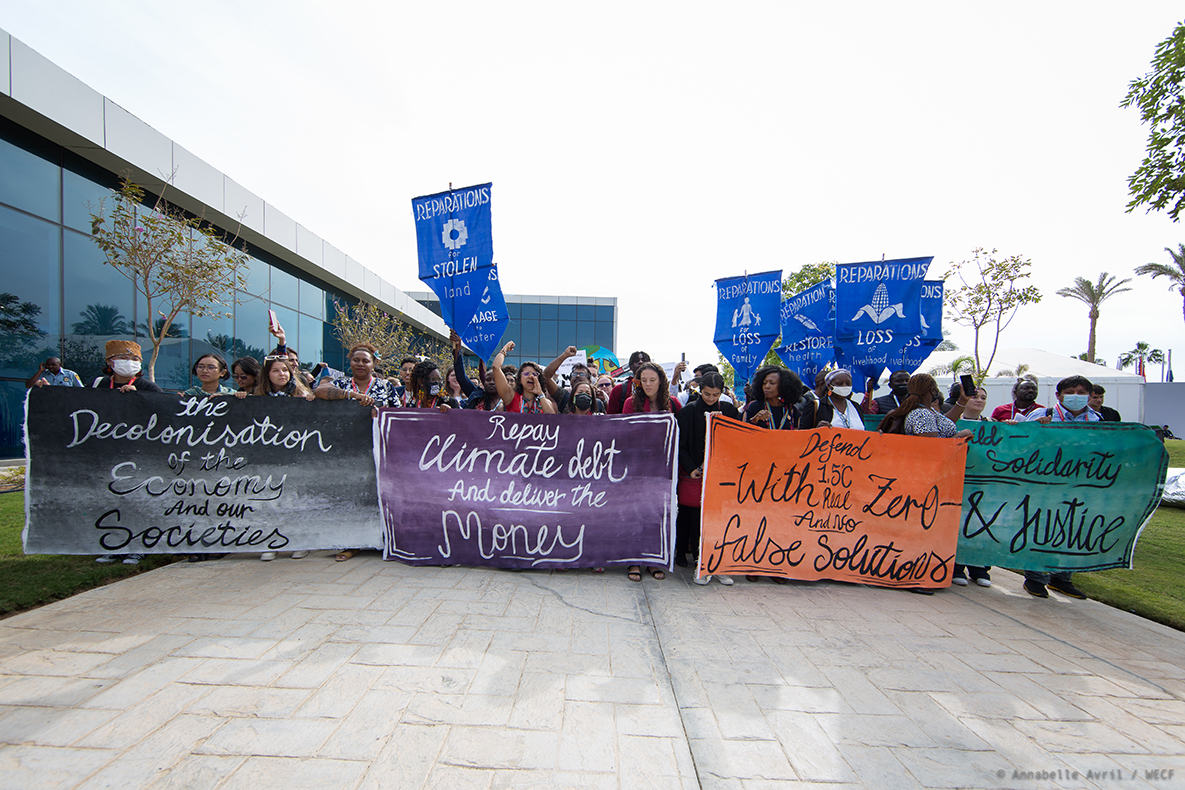Article originally published in Médiapart’s Pour une justice fiscale
By Âurea Mouzinho (Tax and Gender Working Group of the Global Alliance for Tax Justice) & Katie Tobin (Feminist Action Nexus for Economic and Climate Justice)
Over the past year, world leaders have been engaging with Barbados Prime Minister Mia Mottley’s proposed Bridgetown Initiative, a political agenda for reform of the global financial architecture to increase available funds for climate vulnerable countries’ adaptation and development priorities.
This week’s Summit for a New Global Financial Pact, spearheaded by French President Emmanuel Macron, takes this agenda and runs with it. At the summit, leaders will work towards a roadmap to find money for climate action and development—through proposed major increases in lending alongside complicated, “innovative” instruments such as foreign exchange guarantees and currency hedges.
As feminists with a systemic analysis, we are glad that the major players are finally acknowledging that our global structures of economic governance are not working. We agree with the Bridgetown Initiative’s diagnosis of the problem—money for climate and development spending is desperately needed—and with France’s acknowledgement of the urgency to “rethink collectively the international financing architecture.”
But our proposed solutions are radically different, seeking to transform the systems that got us here in the first place and set up our global economic and financial systems to better serve people (especially women and gender diverse people) and protect the planet.
Instead of increasingly complicated proposals to squeeze blood from a stone, we call to attention that resources needed to address the current climate crisis already exist. They are simply poorly distributed within a global financial system that privileges Global North countries and facilitates accumulation by the ultra-rich elites, at the expense of the majority of people around the world, particularly in Global South countries.
A profound systemic reform of the global financial system must center the urgent need to redistribute wealth, resources and decision-making power. Progressive, democratic and structural reforms in international tax governance and national tax systems are an essential part of this puzzle–one that’s so far missing from the Paris Summit and Bridgetown conversation.
Every year, countries around the world lose an estimated $483 billion in untaxed wealth. Developing countries lose disproportionally more compared to richer countries, although the latter play a bigger role in upholding an international web of tax avoidance.
Addressing this loss of public revenues at the systemic level would also require an overhaul of the current debt architecture through which Global South countries are drained of much needed fiscal space for climate action and social spending required to make our world a fairer place.
From a feminist tax justice perspective, the pathway to start delivering the structural transformation that is truly needed entails consolidating proposals that have been circulating for years: improving wealth taxation, taxing excess profits of fossil fuel corporations, ending tax avoidance by multinational corporations, combating financial secrecy and shifting international tax negotiations through a new UN Tax Convention and multilateral body that’s democratically and transparently governed. These proposals add up to trillions of dollars a year in potential public funding for climate action and gender-transformative public services. (Even Avinash Persaud, the architect of the Bridgetown Initiative, makes a similar proposal in the unofficial April 2023 version of Bridgetown 2.0, suggesting international taxes on GHG emissions and corporate profits.)
Operating outside official multilateral processes and sidestepping existing agreements, the Paris Summit represents yet another misguided attempt to drum up voluntary commitments and “leverage” corporate funds for desperately needed national initiatives. If they’re ever actually implemented, they will only uphold our existing unjust economic and financial system.
Together with partners from across the broader economic and climate justice movement, including the Civil Society Financing for Development Mechanism, we reiterate that the Paris Summit is “a distraction.” It entrenches financialised responses to the climate crisis and potentially undermines the progress already made in prioritizing the United Nations as the appropriate forum for decision-making around international financial matters, including global tax cooperation.
Instead of privatized solutions to development spotlighted by the Paris Summit, feminists demand the re-establishment of the role of the state and of multilateralism. Through progressive, democratic and truly intergovernmental reforms of taxation systems and policies, we can redistribute existing resources in support of gender, climate, and economic justice.
Photo: Annabelle Avril / WECF
